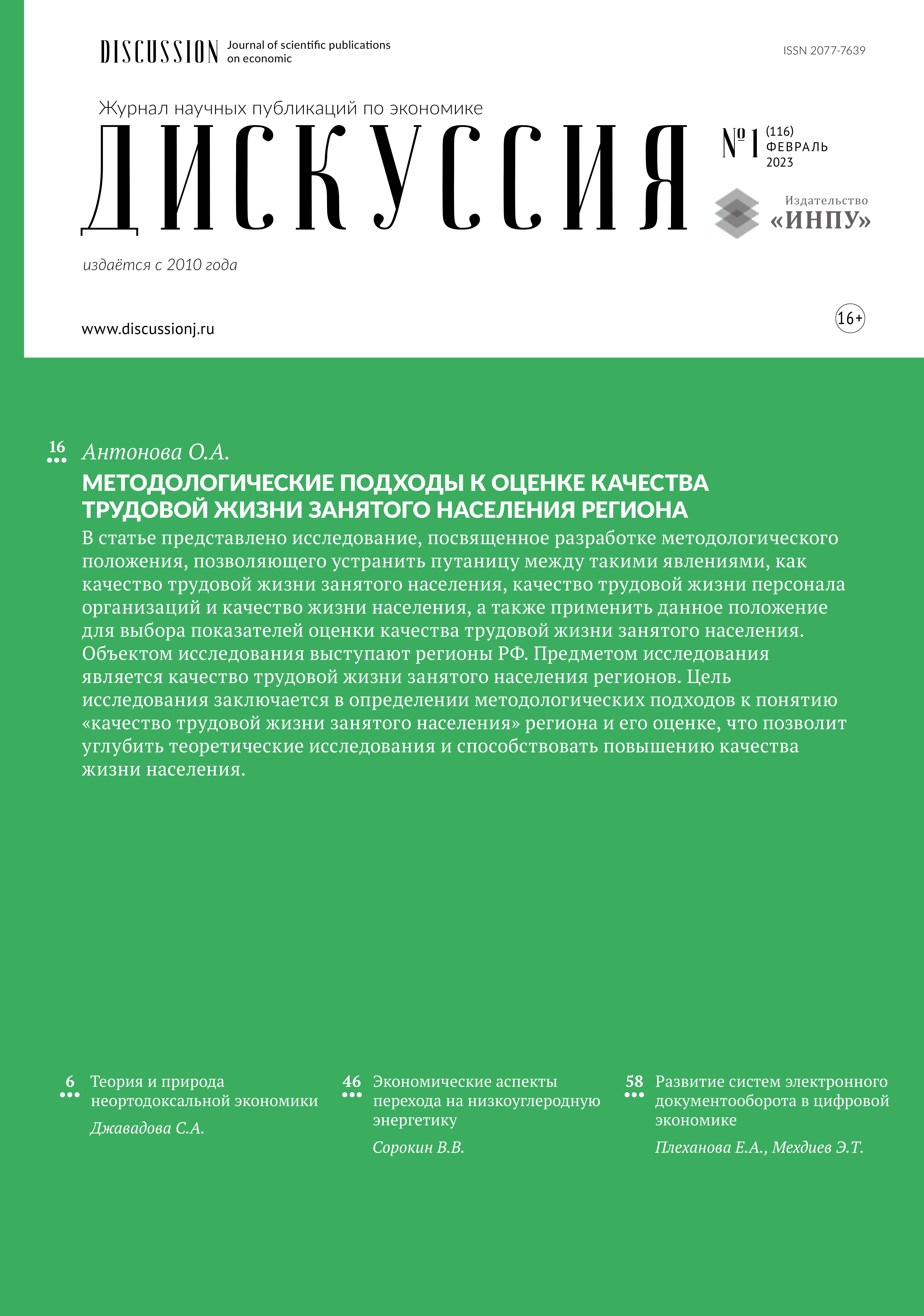ЭКОНОМИЧЕСКИЕ АСПЕКТЫ ПЕРЕХОДА НА НИЗКОУГЛЕРОДНУЮ ЭНЕРГЕТИКУ
Ключевые слова:
Возобновляемые источники энергии, биоэнергетика, пеллеты, энергоэффективность, парниковые газы, энергетическая безопасность, зелёные технологииАннотация
Переход на низкоуглеродную энергетику имеет ряд экономических аспектов, которые могут оказать влияние на различные отрасли экономики и общество в целом. Отказ от традиционных источников энергии эмпирически не подтвердил свою экономическую эффективность, учитывая опыт западных стран в 2022 году. Тем не менее переход на низкоуглеродную энергетику является важным вопросом сохранения экологического и общественного благополучия, данные аспекты рассматриваются в исследовании. Объект исследования – энергетика, как отрасль генерации, распределения, передачи энергии. Предмет исследования – низкоуглеродная энергетика, как вид энергетики, источник которой минимизирует вред для окружающей среды путём значительного снижения выброса парниковых газов в результате хозяйственной деятельности человека. Цель исследования – раскрыть экономическое и техническое содержание низкоуглеродной энергетики в современном мире и России. В исследовании представлены исторические этапы развития низкоуглеродной энергетики. Рассмотрены положительные аспекты перехода на низкоуглеродную энергетику и низкоуглеродную экономику. Представлена классификация низкоуглеродных источников энергии по четырём источникам энергетической безопасности Аргументировано, что наиболее перспективным направлением низкоуглеродной энергетики в Росиии выступает биотопливо. Рассмотрены технические и экономические перспективного источника низкоуглеродной энергии – пеллет.
Скачивания
Метрики
Библиографические ссылки
Ren J., Sovacool B. K. Prioritizing low-carbon energy sources to enhance China’s energy security //Energy conversion and management. – 2015. – Т. 92. – С. 129-136.- DOI 10.1016/j.enconman.2014.12.044.
García-García P., Carpintero Ó., Buendía L. Just energy transitions to low carbon economies: A review of the concept and its effects on labour and income //Energy Research & Social Science. – 2020. – Т. 70. – С. 101664.- DOI 10.1016/j.erss.2020.101664.
Holdren J. P., Morris G., Mintzer I. Environmental aspects of renewable energy sources //Annual Review of Energy. – 1980. – Т. 5. – №. 1. – С. 241-291.
Trainer F. E. Can renewable energy sources sustain affluent society? //Energy Policy. – 1995. – Т. 23. – №. 12. – С. 1009-1026.- DOI 10.1016/0301-4215(95)00085-2.
Herzog A. V. et al. Renewable energy sources //Encyclopedia of life support systems (EOLSS). Forerunner Volume-‘Perspectives and overview of life support systems and sustainable development. – 2001. – Т. 76.- С. 1 - 63.
Kwan J. Europe’s energy crisis hits science hard //Science (New York, NY). – 2022. – Т. 377. – №. 6612. – С. 1244-1245.
Shi H. et al. The impact of China's low-carbon transition on economy, society and energy in 2030 based on CO2 emissions drivers //Energy. – 2022. – Т. 239. – С. 122336.
Gillingham K., Stock J. H. The cost of reducing greenhouse gas emissions //Journal of Economic Perspectives. – 2018. – Т. 32. – №. 4. – С. 53-72.- DOI 10.1257/jep.32.4.53.
Giljum S. et al. Modelling scenarios towards a sustainable use of natural resources in Europe //Environmental Science & Policy. – 2008. – Т. 11. – №. 3. – С. 204-216.- DOI 10.1016/j.envsci.2007.07.005.
Valero A. et al. Material bottlenecks in the future development of green technologies //Renewable and Sustainable Energy Reviews. – 2018. – Т. 93. – С. 178-200.- DOI 10.1016/j.rser.2018.05.041.
Biermann F., Kanie N., Kim R. E. Global governance by goal-setting: the novel approach of the UN Sustainable Development Goals //Current Opinion in Environmental Sustainability. – 2017. – Т. 26. – С. 26-31.- DOI 10.1016/j.cosust.2017.01.010.
Berkhout F. Adaptation to climate change by organizations //Wiley interdisciplinary reviews: climate change. – 2012. – Т. 3. – №. 1. – С. 91-106.- DOI 10.1002/wcc.154.
Севастьянова, С. Н. Биоэнергетика. Древесные (топливные) гранулы / С. Н. Севастьянова // Вестник Оренбургского государственного университета. – 2009. – № 10(104). – С. 133-138. – EDN MLUFMJ.
Костюченко, И. В. Древесная биомасса как перспективный вид топлива для котельных установок жилого сектора / И. В. Костюченко // Экономика строительства. – 2022. – № 12. – С. 73-81. – EDN GPFENX.
Исраилова, Э. А. Рынок твердого биотоплива Российской Федерации / Э. А. Исраилова, Д. В. Личковаха // Вестник Ростовского государственного экономического университета (РИНХ). – 2022. – № 3(79). – С. 152-158. – DOI 10.54220/v.rsue.l991-0533.2022.79.3.020. – EDN YTAYBK.
Кархова, С. А. Оценка тенденций мирового рынка древесных пеллет и перспективы Российской Федерации на данном рынке / С. А. Кархова // Baikal Research Journal. – 2022. – Т. 13, № 3. – DOI 10.17150/2411-6262.2022.13(3).23. – EDN LDQBBS.
Андреев, А. А. Ресурсосберегающее топливо для автотракторных газогенераторов / А. А. Андреев, Д. Ю. Чижевская // Вестник Луганского государственного университета имени Владимира Даля. – 2021. – № 6(48). – С. 28-35. – EDN FVOTNL.
Загрузки
Опубликован
Как цитировать
Выпуск
Раздел
Категории
Лицензия
Copyright (c) 2023 В.В. Сорокин

Это произведение доступно по лицензии Creative Commons «Attribution-NonCommercial-NoDerivatives» («Атрибуция — Некоммерческое использование — Без производных произведений») 4.0 Всемирная.
Авторы, публикующие произведения в журнале «Дискуссия», соглашаются со следующими условиями:
- Авторы сохраняют за собой авторское право и предоставляют журналу право первой публикации произведения, одновременно лицензированной в соответствии с лицензией Creative Commons Attribution, позволяющей другим лицам пользоваться произведением с подтверждением авторства и первоначальной публикации в журнале «Дискуссия».
- Авторы вправе заключать с иными лицами лицензионные договоры на условиях простой (неисключительной) лицензии на использование опубликованного в журнале «Дискуссия» произведения (например, размещение его в базах данных университетов, публикация в книге), со ссылкой на его оригинальную публикацию в этом журнале.
- Автор гарантирует, что является правообладателем всех материалов, предоставляемых в редакцию, и что исключительные права на данные материалы не переданы или не предоставлены другим лицам.
- Авторам разрешено и рекомендуется размещать свое произведение в Интернете до и во время процесса подачи, поскольку это может привести к продуктивному обмену, а также к более раннему и более широкому цитированию опубликованных работ.
С момента загрузки произведения и сопроводительных материалов через раздел "Отправка материалов", автор полностью и безоговорочно принимает (акцептует) публичную оферту о заключении авторского соглашения об опубликовании произведения. В соотвтетствии с этим соглашением автор предоставляет издателю на безвозмездной основе неисключительную лицензию на использование созданного автором произведения.
С момента получения произведения и прилагаемых к нему материалов журнал "Дискуссия" вправе использовать полученные произведения без ограничений по своему усмотрению и в пределах всего срока действия исключительных прав, но с обязательным указанием имени автора (авторов) произведения, в том числе публиковать произведения (полностью или в сокращении) на территории всего мира, переводить на другие языки, направлять в репозитории научной информации, размещать в сети Интернет и использовать другими законными способами.









